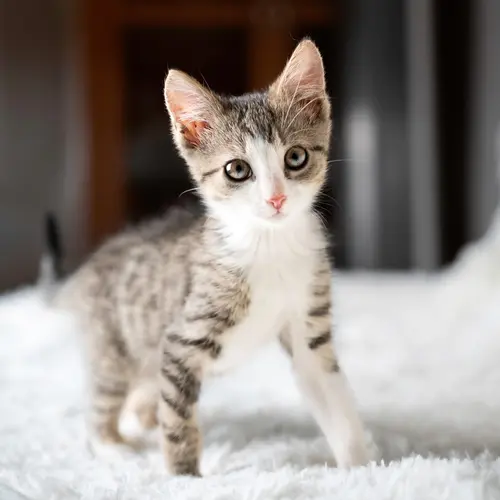Many pet owners assign human emotions and expressions to their furry friends as a joke. However, animals do behave in ways that express their emotions.
We can never truly know what an animal is thinking or feeling, and we also don't know if what we perceive as emotion feels the same way to them as it does to a human. But animal behaviorists do agree that cats get territorial, and sometimes behave in a certain way to establish social dominance. This may result in behaviors that human observers perceive as jealousy.
Signs of Jealousy in Cats
Cat behavior that humans may perceive as stemming from jealousy includes:
- Physically coming between you and the object they are jealous of
- Hissing and growling
- Swatting at an object
- Scratching
- Biting
- Urinating/marking territory
If your cat does any of these behaviors, there could be any number of causes. Contact a professional to get their opinion and advice.
Types of Cat Jealousy
Cat specialists often define jealousy as different types of aggression.
Status induced aggression. This type of aggression in cats results from the unique social structure in cat behavior. They see themselves as more dominant than some people and animals, and less dominant than others. Another name for this is impulse control aggression. Signs of this type of cat jealousy include:
- Blocking access to furniture or doorways
- Making aggressive eye contact with a person
- Rubbing on or spraying everything a certain person has touched
- Soliciting attention but then biting or scratching when pet
- Biting or scratching when a person tries to reposition or move them
According to experts, cats who can not tell whether a person is a genuine threat display this type of aggression. It stems from anxiety in the cat, and the resulting aggression is their attempt to remain in control of their environment.
Inter-cat aggression. This type of aggression is generally seen between two male cats, but it can sometimes be between cats of any gender and may be perceived as one cat being jealous of the other. However, curbing this type of aggression is easy. It is often hormone-related, so spaying and neutering your cats should nip it in the bud.
Territorial aggression. Like many animals, cats are territorial. That means, when they feel someone or something has invaded their territory, they may act aggressively. They may hiss at the "intruder" or even try to attack them. It could be another cat, a new baby in the household, or a guest they haven't met before. In rare cases, it can happen if another cat of the household has been away, and then comes back.
Big changes to the cat's environment, like a new roommate, or moving to a new home can also trigger this behavior. It may also happen when a kitten in the household reaches sexual maturity and is now seen as competition for resources.
Are Cats Jealous When They Sit on Your Laptop?
Many people think that cats are displaying jealousy when they try to get in between you and whatever you are doing. They tend to sit on your computer keyboard when you are trying to type, or put themselves in a book you are reading — literally. But is it jealousy?
Animal behaviorists say that a cat is trying to seek warmth, a good vantage point, or your attention when they exhibit this behavior. A cat's body temperature is higher than a human's, somewhere between 100 and 102.5 degrees Fahrenheit. That is why they love warm sunspots and your cozy laptop.
Some also believe they do it because it smells like you, and they really like you since you are the one who gives them plenty of food and pets. So, they like anything that has your scent on it. People also believe that cats do it to mark their territory. Even if you are using it, they want you to know it's still in their domain.
So, are cats jealous when they get between you and whatever you are doing? They may, in fact, be seeking your attention.
How to Deal With a Jealous Cat
If your cat is getting in between you and what you need to do, but is generally friendly, you can just move them to a new location. There are even decoy laptops to give your cat something nice to sit on while you get your work done. However, if you have an aggressive cat, you will need to take steps to protect yourself.
- If the cat jumps on someone's lap and then displays aggressive behavior, stand up and let the cat fall off instead of pushing it off.
- If a cat is aggressively blocking your entry to a space or an object, walk away and ignore the situation until the cat loses interest.
- Keep something on hand to distract the cat if they become aggressive.
- Avoid situations that give the cat aggressive behavior.
- Avoid giving the cat catnip.
- Consider trying cat anxiety medication.
- If two cats are aggressive towards each other, separate them, and then slowly reintroduce them to each other using positive reinforcement techniques.
- Give treats to reinforce behaviors that are not aggressive.
- Consult your veterinarian or an animal behavioral specialist for more advice.


